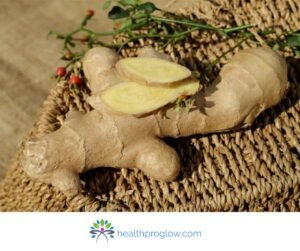8 Amazing Health Benefits of Ginger in Your Diet

Ginger (Zingiber Officinale) is a root grown in Asia and the Tropics, and is widely used as a spice. In complementary and alternative medicine, it has been used to treat ailments of the digestive tract, and it is also known for other purposes. Ginger is a popular spice that has been used for centuries for both culinary and medicinal purposes. Here are 8 amazing health benefits of ginger in your diet:
- Anti-inflammatory properties: Ginger contains compounds such as gingerol and shogaol that have anti-inflammatory properties, making it a useful natural remedy for reducing inflammation in the body.
- Digestive aid: Ginger has been shown to help reduce symptoms of nausea, vomiting, and indigestion. It can also help improve digestion and prevent bloating.
- Pain relief: Ginger has analgesic properties, making it effective in reducing pain from conditions such as arthritis, menstrual cramps, and headaches.
- Immune booster: Ginger has antibacterial and antiviral properties that can help boost the immune system and prevent infections.
- Cardiovascular health: Ginger has been shown to help lower cholesterol levels and reduce blood pressure, both of which are important for maintaining good cardiovascular health.
- Weight loss: Ginger can help boost metabolism and reduce hunger, making it a useful tool for weight loss.
- Cancer prevention: Some studies suggest that ginger may have cancer-fighting properties, particularly in relation to colorectal and ovarian cancers.
- Anti-aging: Ginger contains antioxidants that help protect the body from free radical damage, which can contribute to aging and disease.
Overall, adding ginger to your diet can provide a variety of health benefits. It can be used in a variety of ways, such as adding it to tea, smoothies, or cooking with it in meals. However, it’s important to note that ginger may interact with some medications, so it’s important to talk to a healthcare professional before adding it to your diet

Comments